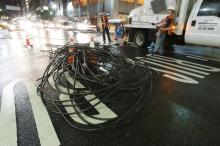Alexandria, Virginia Moves Forward with I-Net, Looks to Kick Comcast to the Curb
While it’s been somewhat of a rarity in larger metropolitan areas, the city of Alexandria, Virginia (pop. 158,000) is hoping to bring residents fast, reliable Internet access by building out an institutional network (I-Net) in the state’s seventh largest city.
Construction of the I-Net, which is expected to be completed by February 2025, will connect the city’s schools, public safety buildings and other facilities, and lay the foundation for a city-wide fiber-to-the-home network.
Instead of waiting for Comcast to give residents the service they need, in August the city broke ground on the project that was long in the works. The main aim is to connect government facilities with the hope that the city will lease out the conduit to a private Internet Service Provider (ISP) as a way to incent more broadband competition.
According to the city’s broadband webpage: the “Municipal Fiber project will create potential partnership opportunities to expand consumer choice and increase available speeds for broadband services.” If the city moves forward with a public-private partnership, it could make the municipal network one of the largest in the country.
City officials have created a Request for Proposals (RFP) process, in which they will be looking for ISPs that have a track record of connecting other communities in the state. The winning bidder would then be given a contract to build a fiber network that best serves the public interest, working closely with the city in deploying network infrastructure.
Broadband In the Works
Virginia is one of the 17 states that puts restrictions on municipal networks, mandating that “municipal networks impute private sector costs, pay additional taxes, set excessively high prices, and/or refrain from subsidizing affordable service, in the name of protecting private ‘competition.’” But that hasn’t stopped city officials from finding solutions to the lack of high-speed connectivity in the community.



